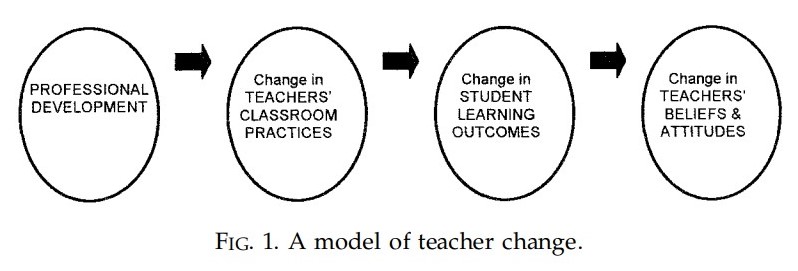“The crucial point is that it is not the professional development per se, but the experience of successful implementation that changes teachers’ attitudes and beliefs.” – Thomas R. Guskey (2002)
CTLT Institutes invite practitioners – faculty, staff, and graduate students – to share their insights, best practices, lessons learned, and actionable approaches with our teaching and learning community, with goals to bring about incremental yet impactful changes to enhance student learning and experiences.
Traditionally, the support offered to Institute Facilitators primarily focused on workshop logistics. Occasionally, consultations re: workshop development and alignment were available at request.
Apart from resource considerations, I think that the lack of professional development support for our Institute Facilitators was a manifestation of an unexamined assumption: these educational leaders, given their vast experiences in the classroom, know how to support their peer’s professional development needs. It seems inconsistent and unreasonable to expect our Institute Facilitators to effectively develop our workshop participants without providing any professional development opportunities for them. Therefore, I developed a facilitation workshop for our Institute Facilitators with hopes to improve the overall quality and interactivity of workshops offered.

In order to demonstrate the desired impact of professional development to our Institute Facilitators, I incorporated Guskey’s Model of Teacher Change (Figure 1) in the following ways:
- At the Institute Facilitation Workshop, Institute Facilitators will develop strategies in anticipation for common facilitation challenges in the context of CTLT Institutes and identify ONE tangible change to implement in their upcoming workshop,
- During the Spring Institute, Institute Facilitators have the opportunity to actionize the stated change in their facilitation practice and to observe the impact on their participants, and
- The Institute Facilitators will be asked to complete a summative feedback form, with specific questions that invite reflection around their process and experience in implementing the stated change (or not).
This is a pilot “experiment” on the level of our Institute Facilitators – it is important to identify effective professional development activities to create enduring changes in “the professional practices, beliefs, and understanding of school persons toward an articulated end” (Grifin, 1983, p. 2). My ultimate goal is to make this Institute Facilitation Workshop an integral part of all CTLT Institutes, so that it’ll serve as at least one embedded mechanism to provide continual follow-up, support, and pressure (Guskey, 2002) for our Institute Facilitators’ ongoing educational improvement. Hopefully, the feedback collected from this process may help inform how best to support our participants in sustainably improving and changing their teaching practices.
References:
- Griffin, G. A. (1983) Introduction: the work of staff development, in: G. A. GRIFFIN (Ed.) Staff Development, Eighty-Second Yearbook of the National Society for the Study of Education (Chicago, IL, University of Chicago Press).
- Guskey, T. R. (2002) Professional Development and Teacher Change. Teachers and Teaching: theory and practice. 8: 381-391.
 Follow
Follow